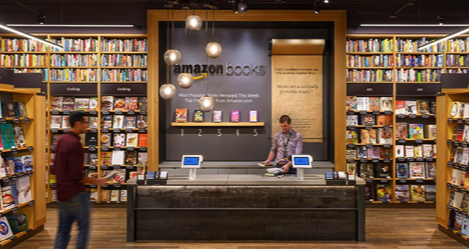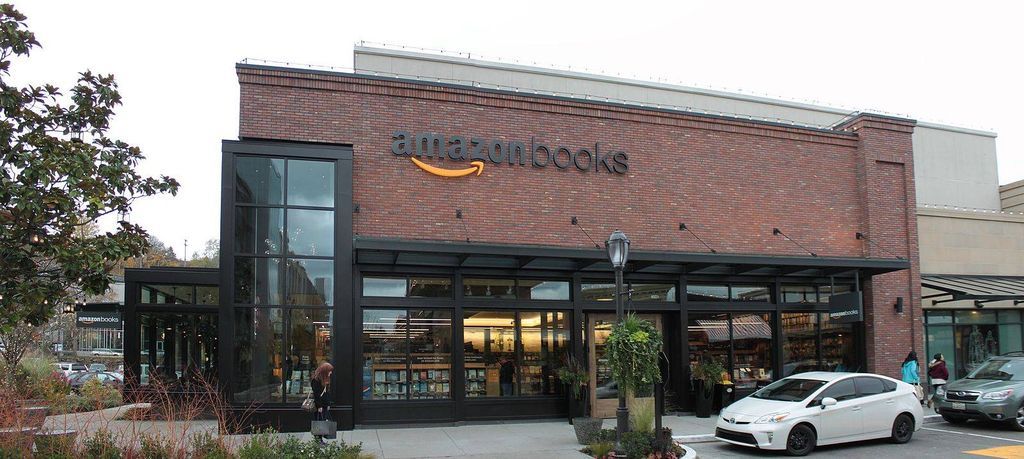
Musings on the Meaning of Bookshop: Are Amazon Books Really Bookshops?
I was in an Amazon Books store recently when I overheard a salesperson ask a customer if she needed any help. The customer replied, “I’m only browsing. I’m just glad that there are still real bookshops around.”
That was a reply that launched a thousand thoughts and questions in my mind, and it really came down to this: Is Amazon Books a real bookshop?
Almost ten years ago, I completed my Honours research in Sydney, Australia. It was a year-long research project that culminated in a 20,000 word thesis, and my topic was independent bookshops in Sydney: had rationalisation and consolidation in book retailing led to a decline in independent bookshops? In other words, was the rise of chain bookshops and online retailers like Amazon killing the indie book industry? I interviewed thirty independent bookshop owners and managers across the city, and their answer was an emphatic “no.” Indies were doing just fine, thank you very much.
Indie bookshops not only survived but thrived by differentiating themselves from the chains and online retailers: they tried to stock more diverse, eclectic, or unusual titles, specifically tailored to their customers and local market. As one bookseller put, they tried to have stock that was more than just the ‘vanilla offerings’ of the chain bookshop down the street.
They also tried to turn book-buying into an experience, by creating spaces with an inviting atmosphere where you would want to spend an afternoon. There might be couches to sit on, soft lighting, relatively hidden nooks and crannies, or a cafe.
A few years ago, I was completing the fieldwork portion of my PhD research, and interviewing librarians about how they curated their collections and decided which titles would end up on library shelves. One collections librarian said something that has stuck with me ever since: a library is not a free bookshop. The collection needs to have depth as well as breadth, so that if someone was researching somewhat obscure topics like the use of painkillers by middle class mothers in nineteenth century Australia or what popular opinions about climate change were in the 1970s, they would be able to find that information. A library’s collection should not just be about stocking the latest bestsellers or the new releases seen in an airport bookshop. It should include the old, the strange, and the books that may be out of print or difficult to source elsewhere.
So from this particular librarian’s perspective, a bookshop typically only has newer books, and not necessarily depth or breadth to the stock. From the perspective of the independent bookshop owners and managers, a good bookshop will have the bestsellers and new releases, but also some more unusual offerings that are meant to appeal to that particular shop’s audience. It will be an excellent place to browse because it is comfortable and full of books.
From what I have seen of Amazon Books, it is precisely what the librarian imagined a bookshop to be (and perhaps a bit worse), and not very much like the independents at all. It’s not even similar to the chain bookshops, really.
It’s not just the promotion of Amazon throughout the store, or the electronic section that takes up a good portion of the front of the store.
In my local Amazon Books (and this is common to all of their stores), books are displayed with their cover out, and there are just not that many books. This is not where you go if you’re after something from an author’s backlist. This is the place to go for bestsellers and new releases, the books that have been receiving a lot of buzz from the book world and beyond.
To me, Amazon Books are not bookshops. They are showrooms for books, much like a car dealership. Or they are a museum for books, but one where you are able to buy the product on display. Part of me is glad that in my local shopping centre there is still somewhere to touch and buy a physical book, but I wouldn’t go as far as to put it in the same category as the local indie or even the neighbourhood Barnes and Noble.
Back in 2008, when I was interviewing, indie bookshop owners commented that they did not compete with Amazon. They didn’t see Amazon as direct competition because what they sold was different. Besides, the only way they could have directly competed was by lowering their prices and that would have been unsustainable. Now, with Amazon opening more physical shops (there will be new Amazon Books stores opening in 2018 in Austin and Washington D.C.), it may seem like they are closer to directly competing with indie bookshops after all. But are they really? I suppose it might look like that to some people, but I’m still not convinced that it’s a real bookshop.
(Note: For more on the Amazon Books Store experience, see here. There is also a related piece here on why the success of Amazon Books should make you angry.)















